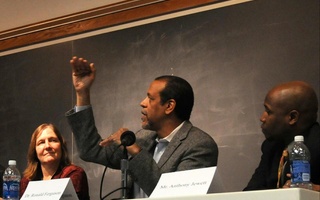
Richard Murmane, Professor of Education at the Graduate School of Education, discusses the rising inequality in children's education and his new volume about this growing trend in Longfellow Hall yesterday evening.
New research on inequality in education indicates that over the past 30 years, increased disparity in family income levels has resulted in unequal educational attainment for students.
These findings challenge the prevailing assumption that children in the United States have a better chance of attaining upward social mobility through education than students in other industrialized nations, according to Harvard Graduate School of Education Professor Richard J. Murnane and University of California, Irvine Professor Greg J. Duncan. The two professors edited “Whither Opportunity?: Rising Inequality, Schools and Children’s Life Chances,” a new book that explores the relationship between educational achievement and family financial status.
“If a child is growing up poor, chances that his children will not grow up poor is a great deal better if you live in one of these other countries,” said Murnane. Most Americans are not aware of this “striking and disturbing pattern,” he said.
The book includes 25 chapters by nearly 50 different economists, sociologists, and educational policy experts.
As the gap between the richest and poorest families in America has grown, an increasing number of families are unable to enroll their children in enrichment activities, which researchers identified as crucial to a student’s success in the classroom.
In addition, financial burdens increase the stress levels in low-income households, which negatively impacts a student’s educational outcomes.
“You can put together a story where at least some of increase in the gap in test chores and achievement is a function of what money can buy,” Duncan said.
According to Murnane, the increased segregation of residential areas by income has resulted in lower standards in teaching quality and higher rates of student turnover throughout the school year.
But Duncan said that there is evidence that the racial achievement gap has been reduced significantly during the same period, which is promising for closing the socioeconomic achievement gap in the future.
Murnane also discussed the importance of parental involvement in children’s education. “Parents are clearly important, but we haven’t made very much progress on defining interventions that really improve or alter parenting, or support low-income families better,” Murnane said.
Murnane and Duncan said that they are currently conducting research on pre-kindergarten programs in Boston and high school programs in New York that de-emphasize the role of parents.
Read more in News
In Final Week of Bargaining, Custodians Express ConcernsRecommended Articles
-
More is MoreWhile shrinking summer might make fifth graders gasp in horror, it is also could be an important step in revitalizing American public schools.
-
Former Basketball Captain Arne Duncan '87 Comes to CampusAsk anyone for the biggest alumni name in Harvard men’s basketball, and you’ll probably get Jeremy Lin '10. Although he’s clearly proven himself deserving of the attention, several other former Crimson basketball players have made names for themselves off the court—one of them being the current United States Secretary of Education, Arne Duncan '87.
-
 Arne Duncan Encourages Students to Serve
Arne Duncan Encourages Students to Serve -
 Panel Discusses Education Gap
Panel Discusses Education Gap -
 Arne Duncan
Arne Duncan -
'Barley Patch' a Harrowing, Self-Referential Exploration of Creativity“Barley Patch,” a new novel by Gerald Murnane, takes the landscape of the mind, with its fragmentary images and memories tightly woven, as its setting.













